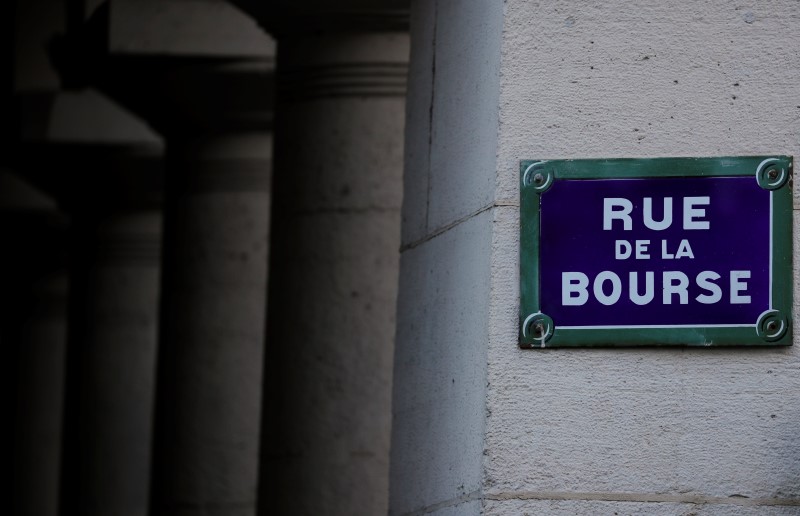By Sujata Rao
LONDON (Reuters) - Fearful of a right-wing resurgence in upcoming elections, European investors have cut euro zone equity holdings to two-year lows and say they are hedging risks via options, gold and short positions on French bonds.
Participants in Reuters' latest monthly survey of 17 European funds also appeared to have become wary of equities overall after recent scorching gains, amid uncertainty over what policies U.S. President Donald Trump would choose to pursue.
The poll was conducted between Feb. 13-24, a time when world stocks hit record highs (MIWD00000PUS), the market cap of the U.S. S&P 500 (SPX) index surged past the $20 trillion mark for the first time and European shares jumped to 14-month highs (STOXX) amid optimism on economic growth.
But it also coincided with growing unease over European politics ahead of Dutch, French and German elections. Investors are especially unnerved by a strong showing in opinion polls by anti-European Union candidate Marine Le Pen in France.
Polls indicating she will win the April 23 first round of the presidential election sent French bond yields to 15-month highs earlier in February, although they suggest she will lose the May 7 runoff to centrist Emmanuel Macron or conservative Francois Fillon.
"We see the most risk in U.S. politics and French elections," said Robeco strategist Peter van der Welle, who has hedged his portfolio with a short position in French government bonds against U.S. Treasuries.
"The risk for an EU break-up is non-negligible, with someone regarding the EU to be a failure (Le Pen), running a 26 percent probability of winning the French elections this spring," he said.
Jan Bopp, asset allocation strategist at Bank J Safra Sarasin agreed that European elections were the main risk, along with Trump.
"A material shift to populism or political extremes in Europe could disrupt the region's path towards economic recovery," he said.
Money managers were nevertheless not anticipating near-term euro breakup: none of the funds that answered a special question on the issue said they were positioning specifically for this outcome. But many are acting to protect portfolios by loading up on bonds and cutting equities.
Europe allocations in equity portfolios fell 2 percentage points on the month to 29 percent, the lowest reading since November 2014, and down from 35 percent a year ago, despite clear signs of economic recovery.
In bond portfolios, allocations to Europe rose to 59.5 percent, the highest since November.
Nadege Dufosse, head of asset allocation at Candriam, has not reduced euro zone exposure but has hedged French election risks with a short French government bond position versus German Bunds. Others, such as Pioneer, said they were hedging European risks with option strategies or by holding gold.
"On some of our funds we have taken advantage of the low cost of volatility to hedge part of our equity exposure," Dufosse said.
In global portfolios, equities were cut to 43.9 percent, a three-month low, while the share of bonds rose to 40.2 percent, up 1.5 percentage points from January.
Meanwhile, investors are hoping Trump's presidential address later on Tuesday will contain details on his spending and tax reform plans. His agenda has lifted U.S. equities 10 percent since his Nov. 8 election win but the rally could be doused if he remains vague on timing and implementation.
U.S. equities were trimmed marginally to 40.8 percent, though these levels stand just off October 2015 highs. Japanese stocks remained in demand, with allocations at a 13-month high of 8.4 percent. The Nikkei has rallied for four years straight but is up only 0.4 percent this year (N225).
"We think that the reflation trade is widely discounted and that markets have become complacent to downside risks," said Joost van Leenders, chief economist for multi-asset solutions at BNP Paribas (PA:BNPP) Investment Partners.
There is also the possibility that Washington will label China, Germany or other large trade partners as currency manipulators, implying they keep exchange rates artificially low to gain a trade advantage. Such a move and follow-up measures could decimate global trade, which is already in the doldrums.
Only one of the participants who answered a special question on the topic thought this would happen, although all acknowledged the risks of a politically driven decision.
"We do not expect it, but there is a relatively high risk that the U.S .... will name any country that intervenes in the FX market as a currency manipulator," said Pieter Jansen, senior strategist, multi-asset at NN Investment Partners.
"This risk is highest for China, and perhaps also Japan."
